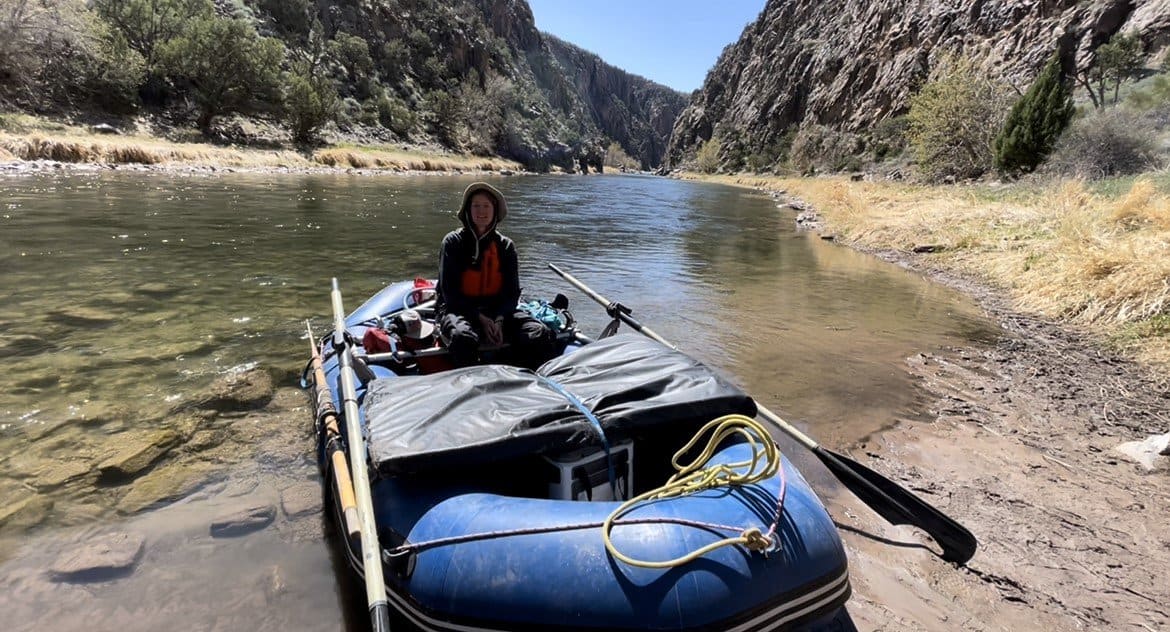The Modern Mountaineer Innovation Challenge is a campus competition designed to engage students in product creation and business model design for the circular economy, reusing existing materials in the creation of a new product.
The challenge is offering a $10,000 prize, in addition to an automatic spot in the ICELab’s incubator program, to the winning team of the first year’s competition. The central theme for the first competition is outdoor industry products.
The challenge was established in the Fall of 2021 by an interdisciplinary faculty and student team that included Western Business Professor Dr. Taryn Mead, University of Colorado (CU Boulder) Partnership Program Director and Engineering Lecturer Jenifer Blacklock, Environment and Sustainability (ENVS) Professor Ricardo Vázquez-Perales, and Outdoor Industry MBA (OIMBA) Candidate Skyeler Smith.
Throughout the competition, teams participate in a variety of entrepreneurial workshops, receiving guidance from the ICELab, local entrepreneurs, and Western professors in topics like life cycle analysis, building out a viable business model, and pitching their business ideas. OIMBA Candidate Smith says that the life cycle analysis workshop was her personal favorite and spoke directly to the need for the challenge.
“Life cycle analysis has everything to do with consumerism…I think it’s just good to be reminded of how much of an impact everything we do, and order, and consume, has on the environment,” she adds, referencing the sourcing of materials that she is current examining in her Sustainable Product Development course.
Smith says that while it can be tricky to manufacture products in rural Colorado, the challenge proves that it is possible to create localized, sustainable products with the proper combination of resources, planning, and entrepreneurial spirit.
The first year of the challenge has demonstrated the flexibility amongst the challenge’s organizers in both structure and timeline, notes Smith. The pandemic, coupled with the newness of the challenge, have necessitated a variety of changes. Eyeing the future, the challenge will continue on, shifting themes each year and looking to expand in scope.
The lead program sponsors are the CU Boulder Partnership Program and Massachusetts-based VentureWell, an organization that funds and cultivates young entrepreneurs and their socially beneficial businesses. Their funding has made the cash prize possible, in addition to the purchase of required materials for the two competing teams.
You are encouraged to vote for your favorite innovation team as we celebrate the hard work each team put into this competition.
The final pitch presentations will be accessible to the public for voting via this link between April 11 and April 29.
Grün Ski: Crafting a more sustainable ski pole
Alex Pedersen is a junior studying Applied Physics at Western. Last fall, Pedersen and his roommate Kyle Van Hoesen, a junior studying engineering, were kicking around an idea for a product and business venture involving ski poles. At the time, Pedersen remembers thinking the idea would be out of reach. “We have no way to do it, really. We live on a college budget,” he says.
“The day before [the challenge] was announced we were sitting, talking about the product that we’re [now] making,” relays Pedersen. “We were sitting there thinking of how much of the recycling [material] at Western isn’t actually recycled, and we were like ‘what if we could do something with that?”
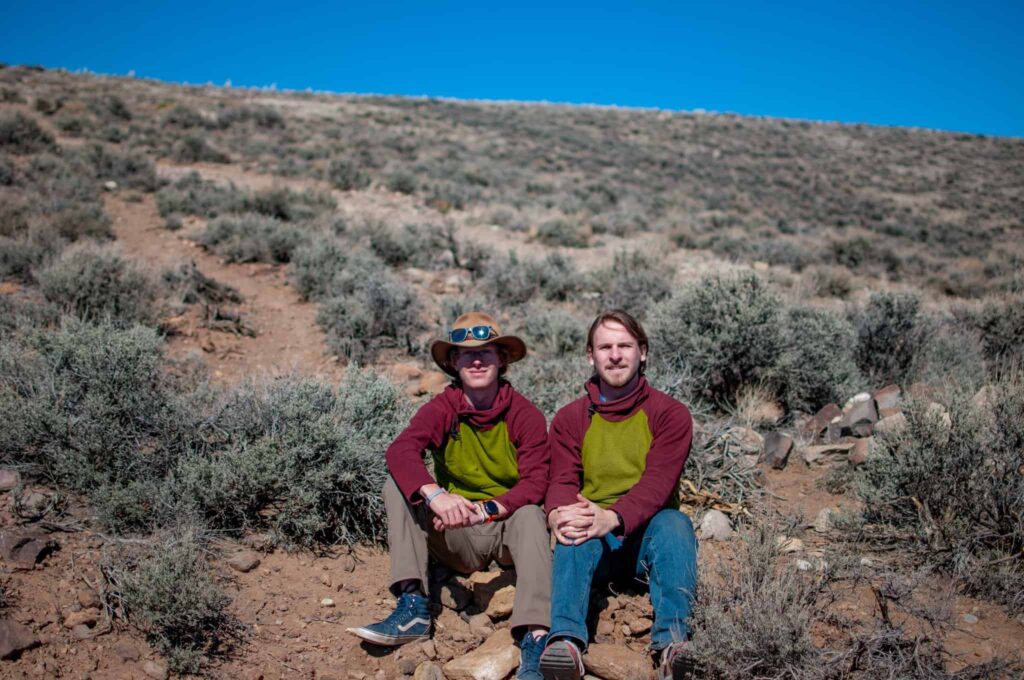
Thankfully for them, the Innovation Challenge was offering advising, support, and access to funding opportunities. Pedersen and Van Hoesen’s initial idea was to manufacture ski poles from aluminum cans. “We’re both outdoorsy [people], we do a lot of climbing, backpacking, hiking, skiing, et cetera,” says Pedersen of the rationale beyond the product choice. “A lot of the things that we use on a daily basis are fairly complex machines, and ski poles are not…and the idea came to us during ski season,” adds Pedersen with a chuckle.
The process to create aluminum poles in a financially viable manner is typically done on an industrial scale requiring millions of dollars of production equipment. With this finding, the team pivoted, deciding to focus on the plastic handles and baskets of the poles, parts that often break during regular wear-and-tear.
With the idea formulated, the team jumped into the challenge in October, and gave their first official pitch on Nov. 15. The groups all got feedback on their pitches from the challenge organizers and mentors, which Pedersen describes as immensely helpful to clarifying their idea and seeing that it could become a reality.
The team has since built a plastic shredder, an injection molder, and two product molds for the handles and baskets that will transform #1, #2, #4, #5 plastics into usable ski pole parts in the circular process. Western’s campus, which partners with Gunnison County for recycling, currently can only recycle #1 and #2 plastics.
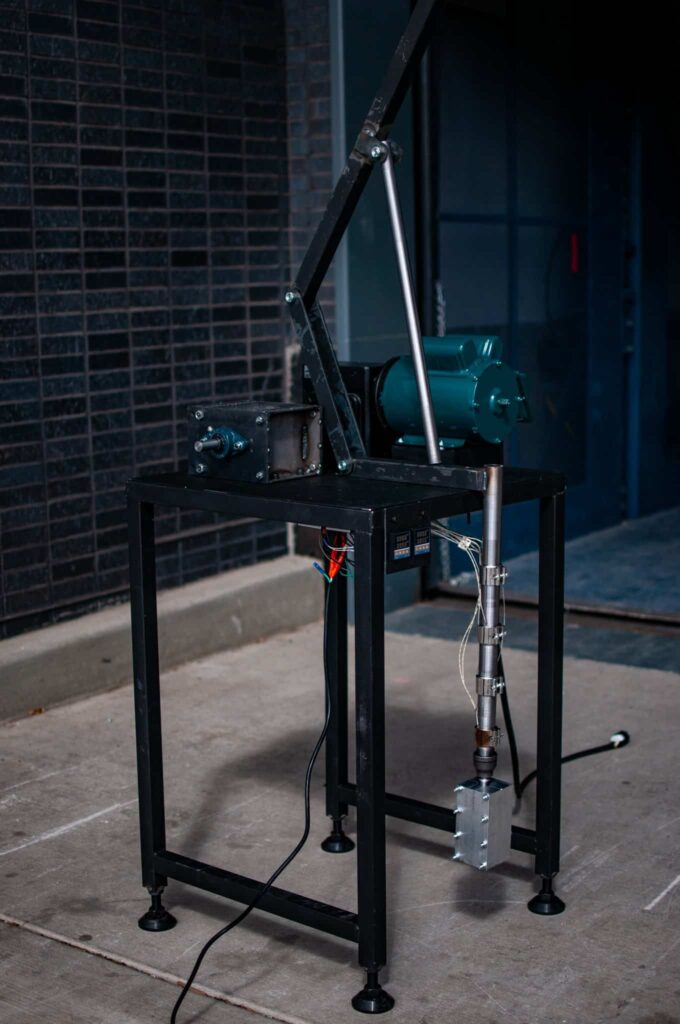
“We have big bins of shredded plastic that are all recycled, and all we have to do is put them in a machine and pull down on the lever and we have a product,” says Pedersen. The team spent about $2,000 on their equipment setup ($1,500 of which came through challenge funding) and can now turn out new pole handles and baskets at interchangeable retail quality for 30 cents apiece using heat molding.
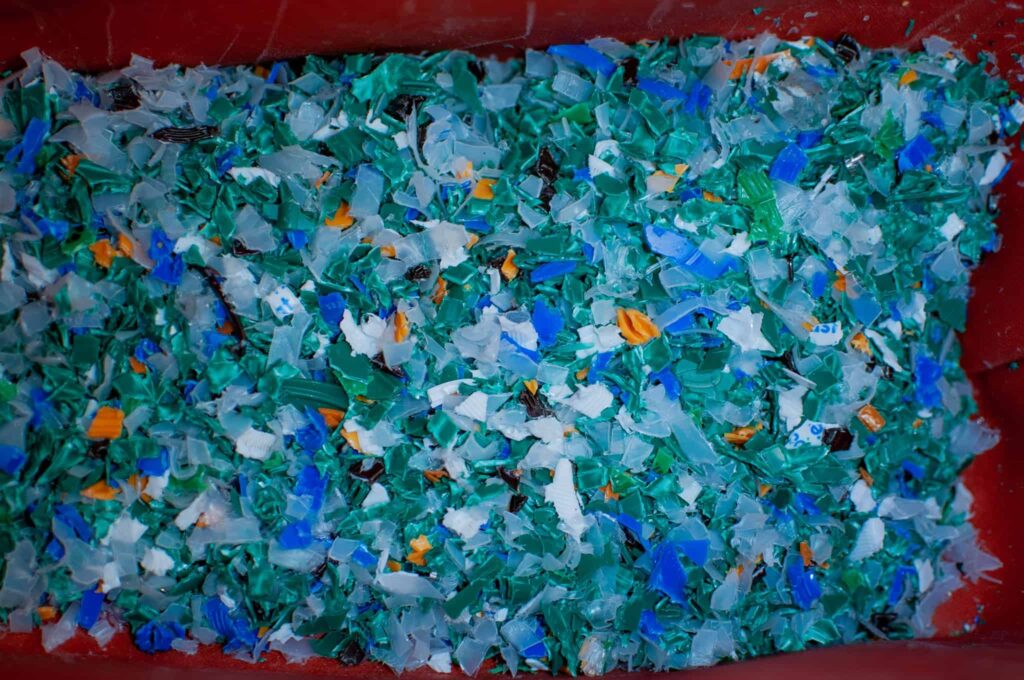
“Once that cools in the mold, you open up the mold and you have a product, with finishing touches like sanding off little rough corners,” says Pedersen.
With the product in hand, the challenge for Pedersen and Van Hoesen is to turn their product into a viable business. They have been advised and mentored along the way by Georgia Grace Edwards, a co-founder of the Gunnison-based SheFly.
“How do you run a startup? How do you pitch this to people? Those things that I have never touched before– I mean I’ve done manufacturing my whole life…but how am I going to go to somebody and pitch them my idea and potentially get money from it?” asks Pedersen.
The group is in the process of building a cohesive business plan with their market research and newly created product, along with their mission centering the growing importance of responsibly reusing materials.
Pedersen envisions selling their 100 percent recycled handles and baskets to rental shops, which often discard any damaged equipment, as a viable strategy. “Having the opportunity to go to them, and be like ‘hey, you could reduce your costs to replace these when they’re broken,” he says.
Another option they are considering is to sell directly to consumers, predominantly online. “Following Cotopaxi’s ‘everything’s recycled,’ so everything looks different, but that gives it personality [vein],” notes Pedersen.
If the group wins the $10,000, they will likely plug the funds into new machinery, a commercial space, and some startup advertising costs.
The link to the final competition voting can be found here.
Recycled Raft Materials (RRM) Labs: Building a better Paco Pad
For the trio of Bradley DiVincenzo, Hannah Mech, and Ryan Huck, the announcement of the challenge back in the fall of 2021 catalyzed a new idea, centered around a shared love of boating.
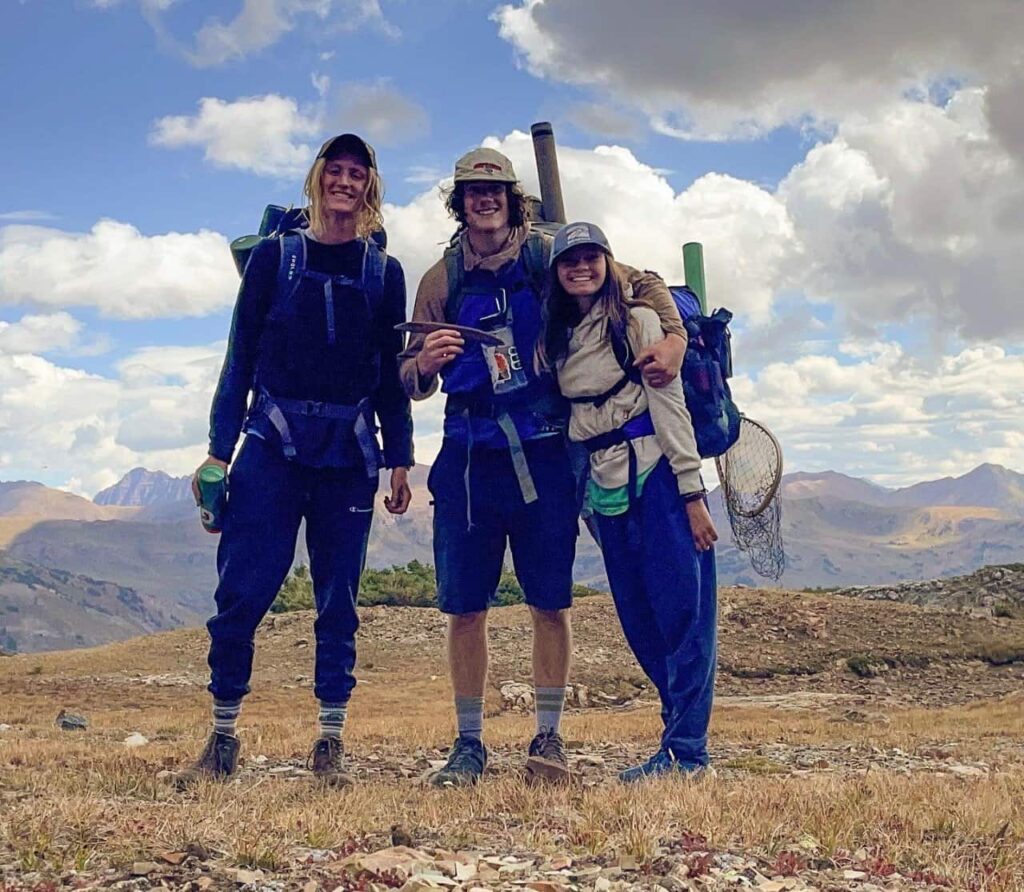
Omnipresent within the rafting industry are Paco Pads, waterproof, two-inch thick sleeping bags that are designed to enable rafters and other outdoor users to sleep on rocky, rough surfaces comfortably.
The pads are manufactured by Jack’s Plastic Welding in New Mexico and utilized on nearly every guided excursion in popular raft destinations like the Grand Canyon. Unfortunately, the pads are composed of PVC, produced largely in China in a toxic, expensive process with massive carbon outputs. Even after the product is completed, the pads can leach toxins into the natural environment.
Accordingly, the team is planning to produce a recycled version, made from upcycled vinyl billboards from Mile High Outdoor Advertising on the Front Range. The team admits that although the process of creating vinyl is not without negative impact, the use of waste billboard material is preferable to utilizing virgin PVC.
Securing the required material was a significant hurdle at first, but with a reliable supplier, the team believes they can create a high-quality product that is cheaper than the current options, which range from about $200 to $400 depending on the model and size. They currently have two billboards, enough to yield about four finished pads.
This past week, the team has been building out their prototype, heat-welding the vinyl together into pad form. “It’s kind of funny, watching three people trying to heat weld and make measurements for the first time,” says DiVincenzo, a freshman studying Biology. The team notes that once they can secure more funding, they will be able to contract out welding services to professionals and greatly increase their production speed and quality.
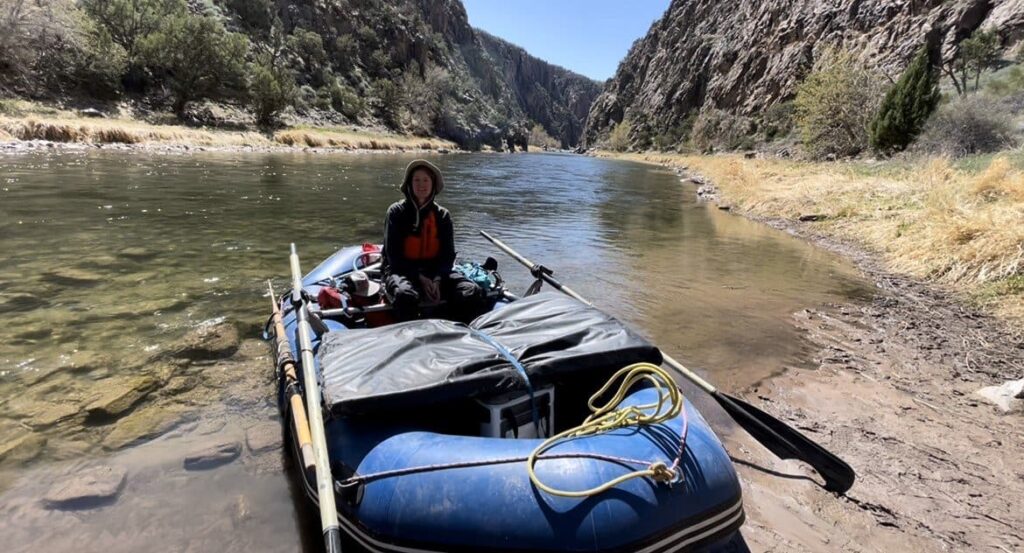
The team sees a built-in market in the rafting community, outdoor lovers who are always looking for a high-value product, and who want to do right by the natural environment. Huck, a sophomore studying Business with a minor in Recreation and Outdoor Education (ROE), envisions that 20 percent of the business’ revenue would be plowed back into conservation efforts, funding groups like Protect Our Winters and the Upper Gunnison River Water Conservancy District.
“One thing we wanted to set us aside in the [outdoor] market is that we are really trying to make a difference, not just sell another product,” adds DiVincenzo of the business’ central focus on sustainability and reduction of environmental impact. Because of their heat-welding process, the trio are cutting out the need to use glue, an environmental liability that can leach into the water.
In the business planning capacity, the team’s assigned advisor, Leonard Mason, an Outdoor Industry MBA student, has been of great help. Mech, a sophomore studying Business who came to Western to obtain the skills to start a business, notes that Mason, who has connections within the billboard industry, was the one who raised the idea of using vinyl billboards.
If the pad team wins the $10,000, they plan to hit the ground running, ramping up their manufacturing efforts, marketing their business and product, and seeking additional investments.
“We have to build up our business model a little bit more as we get the prototype finished,” notes DiVincenzo.
“All our ideas are starting to come to life. It’s one thing to just sit down and write some plans down, and have this skeleton of a business, but it’s another thing to go and pursue it,” adds Huck.
Eventually, the team would like to break into other aspects of the growing rafting industry, devoting resources to researching more sustainable methods of production.
This past weekend, the group went out boating the Gunnison Gorge, looking to try out their new prototype and obtain some footage for their future marketing efforts.
One last time: The link to the competition voting can be found here.

